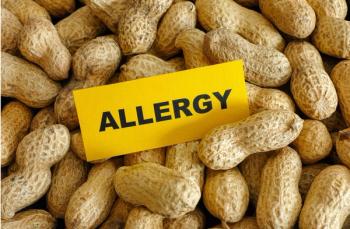
It’s Spring: Let the Ragweed Rage Begin
Serum tryptase or plasma histamine? Montelukast or inhaled corticosteroids? Loratadine or fexofenadine? Try the final round of the seasonal allergy quiz.
Question 1:
A 63-year-old man presented with an intensely pruritic rash diffusely over his body. In addition to edematous, red plaques on the back, abdomen, thighs, and legs, he was noted to have bullae with surrounding erythema on both feet, as seen here. Biopsy revealed parakeratosis; a spongiotic epidermis with lymphocyte, eosinophil, and neutrophil exocytosis.
Answer and new question on next page »
The correct answer is D. Allergic contact dermatitis
For discussion,
Question 2:
Answer and new question on next page »
The correct answer is A. ICS and montelukast were equivalent at 2 months but not at 2 years in affecting asthma control and asthma-related QOL
For discussion,
Question 3:
Answer and new question on next page »
The correct answer is A. True
For discussion,
Question 4:
Answer and new question on next page »
The correct answer is C. 5-grass pollen SLIT can be administered safely in the home from the first dose. (False)
For discussion,
Question 5:
Pollen from annually flowering ragweed is a chief cause of allergic rhinitis in North America.
Answer and new question on next page »
The correct answer is D. All of the above.
For discussion,
Question 6:
Answer and new question on next page »
The correct answer is A. Fexofenadine
For discussion,
Question 7:
A 7-year-old girl with a 2-year history of moderately pruritic lesions on the trunk and extremities, presented with new lesions on the hands and face. She has been treated with triamcinolone for supposed nummular eczema; clotrimazone for possible tinea corporis; and again with topical steroids for eczema. The child is otherwise healthy and there is no known family history of heritable dermatologic conditions.
Answer on next page »
The correct answer is C. Lichen spinulosus
For discussion,
Newsletter
Enhance your clinical practice with the Patient Care newsletter, offering the latest evidence-based guidelines, diagnostic insights, and treatment strategies for primary care physicians.
































































































































